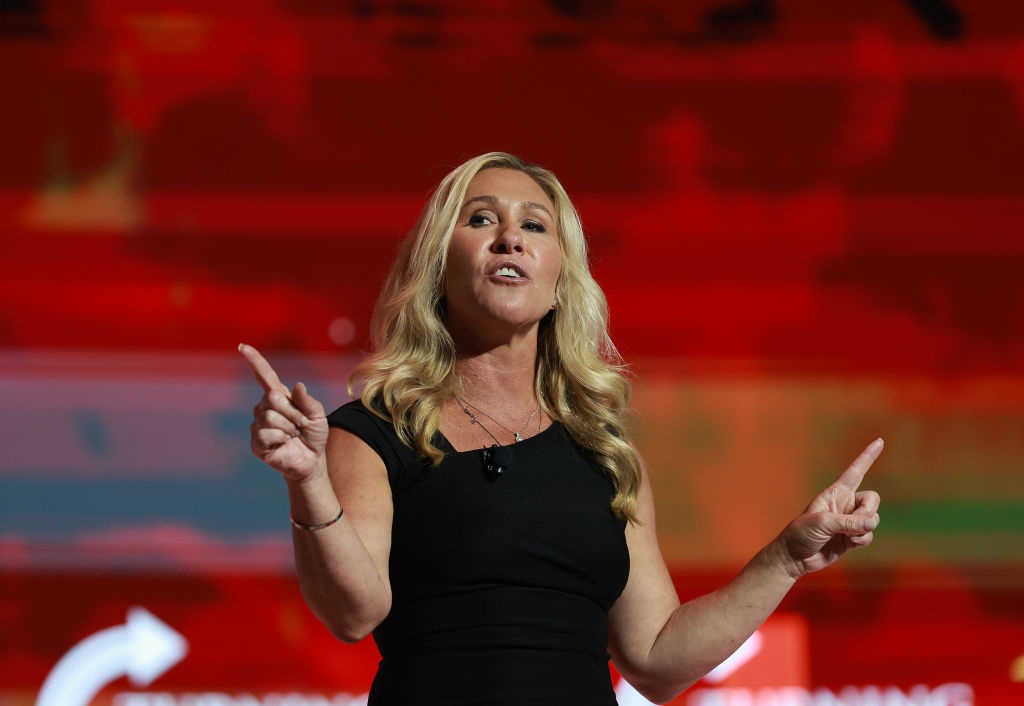
At a Turning Point USA summit in Florida on June 23, Rep. Marjorie Taylor Greene declared, “I’m a Christian, and I say it proudly, we should be Christian nationalists.” Whether she is repeating QAnon conspiracies or spreading misinformation about COVID-19, Greene has made a name for herself by defying fact-based journalism and conventional norms to play to the MAGA base. But when it comes to her embrace of Christian nationalism, she is simply parroting the narrative of the religious right for decades. Since the late 1970s, a right-wing movement responding to the civil and women’s rights movements has used the language of “biblical values” to recruit people of faith. As a white Christian who grew up in the rural South, I know Rep. Greene is preaching to a crowd that has been prepped to respond with a hearty “amen.” The prevalence of Christian nationalism as an ideology makes it the greatest threat to democracy in America today.
Growing up in the Southern Baptist church, I learned this story well: America was special because it was founded as a Christian nation. Our enemies were liberals who did not respect “traditional, biblical values” and threatened the moral order by embracing feminism. By demonizing liberals and trading on fear that their policy decisions would lead us toward cultural collapse, the religious right convinced many in my community that the GOP was God’s Own Party. As a young person, I got involved in Republican politics and paged for Senator Strom Thurmond because I embraced this narrative.
Read More: It’s Time to Stop Giving Christianity a Pass on White Supremacy and Violence
But Christian nationalism wasn’t the only story my people taught me. I also memorized the words of Jesus in Sunday school and knew the Bible’s concern for the poor, the immigrant, the sick, and the downtrodden. The biblical prophets clearly articulated the dangers of religious nationalism and decried the political leaders who devoured their people while religious leaders whitewashed their evil deeds. In the late ‘90s, I had a crisis of faith where I realized that I had to choose between the teachings of Jesus and the lies that Christian nationalism had told me. I did what my Sunday school teachers had taught me to do: I chose Jesus.
More from TIME
But it took me a while to find the community of Jesus followers who rejected Christian nationalism. As it turns out, this was by design. In her book Shadow Network, Anne Nelson has chronicled how Paul Weyrich, one of the founders of the religious right in the 1970s, also helped established the Council for National Policy, a roundtable of leaders of the Republican Party, leaders of the religious right, the NRA, churches, nonprofits, and family foundations. The CNP worked with independent media companies and talk radio to coordinate what Nelson calls the “wallpaper effect” in which the Christian nationalist narrative was repeated and reinforced. Hundreds of millions of dollars were invested in promoting this narrative in communities like the one where I grew up. For its own political purposes, this network conspired to hijack my people’s faith.
Read More: The Unmaking of the White Christian Worldview
Forty years later, when people outside of this cultural world ask how fellow Americans can vote for Donald Trump or repeat obvious lies about a global pandemic or the 2020 election, it’s clear to me how wide the web of Christian nationalism has been cast. Rep. Greene isn’t taking any risks when she declares herself a Christian nationalist. She’s playing to the base that turned out more Republican voters for Donald Trump than have ever voted for any Republican candidate in U.S. history.
Though I know the power of Christian nationalism firsthand, I also know it is a minority movement with a diminishing base. Politicians like Greene are compelled to shout the quiet part out loud because a growing majority of Americans realize the con of religious right. The so-called “pro-life” movement played on imagined concern for the unborn to empower justices who lied in their confirmation hearings, overturned Roe v. Wade, and stripped the Environmental Protection Agency of its power to save lives by mitigating the climate crisis. The same politicians who claim to care about life from the moment of conception refused to extend a child tax credit, and nearly 4 million American children fell into poverty after its expiration. Most Americans reject theocracy by judicial decree, with 6 in 10 opposing the Dobbs decision. What’s more, a recent PRRI poll found that most religious Americans also oppose this crowning achievement of the religious right. The only outliers are the religious communities most directly targeted by efforts to promote Christian nationalism: white evangelical Protestants and Latter-day Saints.
The reactionary forces that targeted my faith community 40 years ago would have never invested the time and resources they did to hijack Christianity if they did not understand its power. Our faith tells us who we are and gives us courage to sacrifice and endure incredible suffering for what we believe is right. Christian nationalism has built a base that is ready and willing to subvert the will of the American people. But Christians who join with Americans of other faiths and of no faith have the opportunity to practice our faith in a way that defends democracy and promotes the common good. If we don’t, it’s clear that people like Rep. Greene, who claim to speak for all Christians, will impose their will on all Americans.
More Must-Reads from TIME
- Cybersecurity Experts Are Sounding the Alarm on DOGE
- Meet the 2025 Women of the Year
- The Harsh Truth About Disability Inclusion
- Why Do More Young Adults Have Cancer?
- Colman Domingo Leads With Radical Love
- How to Get Better at Doing Things Alone
- Michelle Zauner Stares Down the Darkness
Contact us at letters@time.com